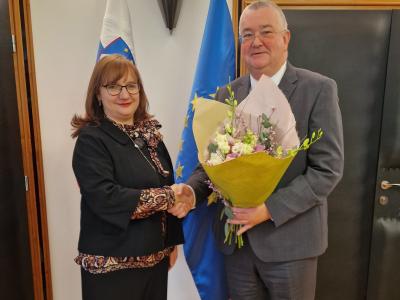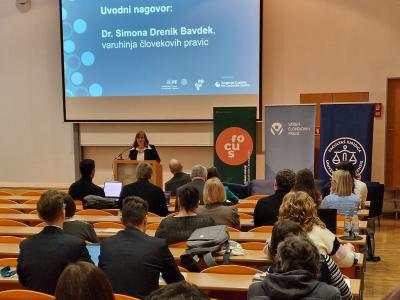The severely ill and socially endangered erased inhabitants of Slovenia must be helped

In agreement and cooperation with the Human Rights Ombudsman Peter Svetina, the President of the Republic of Slovenia, Nataša Pirc Musar, invited representatives of the competent departments to a discussion on the topic of residents of the Republic of Slovenia erased from the population register in 1992. The meeting was attended by the Minister of Labour, Family, Social Affairs and Equal Opportunities Luka Mesec, the Minister of Solidarity-Based Future Simon Maljavac, the State Secretary of the Ministry of Justice Dr. Milan Brglez, State Secretary of the Ministry of Internal Affairs Tina Heferle, and Director of the NGO Amnesty International Nataša Posel. The issue relates to people who were left without legal status and valid documents overnight in 1992, without being properly informed by the State. As a result, they lost access to their economic, social, and cultural rights. Many of them, around 15,000, were forced to leave the country, losing their jobs and hope for a pension. The consequences of erasure are immeasurable and include social, economic, and emotional aspects that continue to burden the people who were affected, and these are the only ones that ultimately need to be remedied.
Therefore, at the request of erased individuals and non-governmental organisations, who are facing extremely dire life situations and, at the end of their lives, are without adequate social and health support (some of these tragic life stories have already been publicly exposed), the Office of the President of the Republic took the position that it is in the interest of the Republic of Slovenia that after many years of injustice, specific persons should obtain a permanent residence permit. This position was also taken by the Human Rights Ombudsman of the Republic of Slovenia. One such example, which has been repeatedly highlighted in the media, is the case of an erased person who lived for decades in difficult circumstances without permanent residence, but after an illness was treated at the University Clinical Centre in Maribor and, based on such an opinion of the Office of the President of the Republic, he obtained a permanent residence permit from the competent administrative unit. This enabled him to finally get a place in a retirement home.
Given that the appropriate measures have still not been taken, we once again call on the Government of the Republic of Slovenia and the National Assembly of the Republic of Slovenia to, on the basis of the draft law drawn up in cooperation with our office by non-governmental organisations (Amnesty International, the Peace Institute and the Civil Initiative of Erased Activists), immediately adopt appropriate legal solutions that will enable those erased and their children who live in Slovenia or would like to return to Slovenia to at least have access to a permanent residence permit in the Republic of Slovenia. There is, however, the possibility of considering other measures that would help to comprehensively solve the consequences of the erasure.
We must find solutions for honest, fair, and comprehensive reparation of injustices. It is a big wound in Slovenian society. We are aware that this is a complex and sensitive topic, but it is time to approach the solution of injustices and restore the dignity and rights that were taken away from the people who were affected.
It is a distinct interdepartmental issue, which does not belong only to the Ministry of the Interior, within which erasure has been discussed until now. We stress that it is not a security issue, but a fundamental issue of the exercise of power in accordance with human rights and fundamental freedoms, which also includes fair redress for systemic rights violations. We therefore hope that the non-governmental organisations' proposal, which was forwarded to the Cabinet of the Prime Minister and the Ministry of the Interior, will be considered at the governmental level and that the views of all relevant ministries will be successfully coordinated.
At the end of the meeting and when the conclusion was reached that it is necessary and humane to take a step forward, the meeting participants of the supported the proposal of the Deputy Prime Minister of the Government of the Republic of Slovenia, Minister Luka Mesc, to highlight the issue of erased persons and the urgent need for systematic elimination of injustices at a meeting with the government.
Source: about:blank












 Back
Back 






